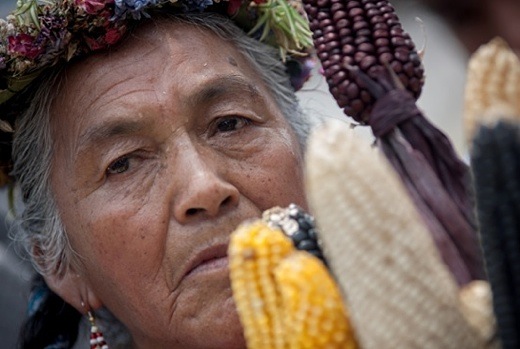SUBHEAD: Company that has come under fire for its genetically modified seeds said its earnings fell for first fiscal quarter.
By AP Staff on 7 January 2015 for the Guardian -
(http://www.theguardian.com/business/2015/jan/07/monsanto-earnings-fall-corn-south-america-genetically-modified-food)

Image above: A woman participates in a protest against Monsanto transgenic corn last year in Mexico City, Mexico. Photograph by Xinhua/Landov/Barcroft Media From original article.
Monsanto said Wednesday its earnings fell 34% in its first fiscal quarter, as South American farmers cut back on planting corn, reducing demand for the company’s biotech-enhanced seeds.
US farmers harvested record crops of soybeans and corn last year, sending prices on those food staples to their lowest levels in years. That has resulted in farmers in South America and elsewhere reducing the number of acres they dedicate to corn. Monsanto said its business was also affected by reduced cotton planting in Australia.
The agriculture products company’s revenue fell more than 8% to $2.87bn in the period, on lower sales of corn seeds and herbicide. Analysts expected $2.96bn, according to Zacks.
The St Louis-based company reported a profit of $243m, or 50 cents per share, down from $368m, or 69 cents per share in the same period last year.
Earnings, adjusted to account for discontinued operations, came to 47 cents per share in the most recent quarter.
Even with the fall in earnings, the results topped Wall Street expectations. The average estimate of analysts surveyed by Zacks Investment Research was for earnings of 34 cents per share.
Monsanto shares have decreased nearly 3% since the beginning of the year, while the Standard & Poor’s 500 index has climbed slightly more than 8%. The stock has increased slightly in the last 12 months.
The food conglomerate has been at the center of controversy over its genetically-modified seeds for some time, with the focus intensifying in the US last year with marches against the firm and a “Millions Against Monsanto” campaign.
In November’s election, Monsanto and Hormel poured millions into fighting an Oregon state measure, Proposition 92, that would have forced companies to label any food containing genetically modified ingredients. The companies narrowly prevailed and defeated the measure.
.
By AP Staff on 7 January 2015 for the Guardian -
(http://www.theguardian.com/business/2015/jan/07/monsanto-earnings-fall-corn-south-america-genetically-modified-food)

Image above: A woman participates in a protest against Monsanto transgenic corn last year in Mexico City, Mexico. Photograph by Xinhua/Landov/Barcroft Media From original article.
Monsanto said Wednesday its earnings fell 34% in its first fiscal quarter, as South American farmers cut back on planting corn, reducing demand for the company’s biotech-enhanced seeds.
US farmers harvested record crops of soybeans and corn last year, sending prices on those food staples to their lowest levels in years. That has resulted in farmers in South America and elsewhere reducing the number of acres they dedicate to corn. Monsanto said its business was also affected by reduced cotton planting in Australia.
The agriculture products company’s revenue fell more than 8% to $2.87bn in the period, on lower sales of corn seeds and herbicide. Analysts expected $2.96bn, according to Zacks.
The St Louis-based company reported a profit of $243m, or 50 cents per share, down from $368m, or 69 cents per share in the same period last year.
Earnings, adjusted to account for discontinued operations, came to 47 cents per share in the most recent quarter.
Even with the fall in earnings, the results topped Wall Street expectations. The average estimate of analysts surveyed by Zacks Investment Research was for earnings of 34 cents per share.
Monsanto shares have decreased nearly 3% since the beginning of the year, while the Standard & Poor’s 500 index has climbed slightly more than 8%. The stock has increased slightly in the last 12 months.
The food conglomerate has been at the center of controversy over its genetically-modified seeds for some time, with the focus intensifying in the US last year with marches against the firm and a “Millions Against Monsanto” campaign.
In November’s election, Monsanto and Hormel poured millions into fighting an Oregon state measure, Proposition 92, that would have forced companies to label any food containing genetically modified ingredients. The companies narrowly prevailed and defeated the measure.
.
No comments :
Post a Comment